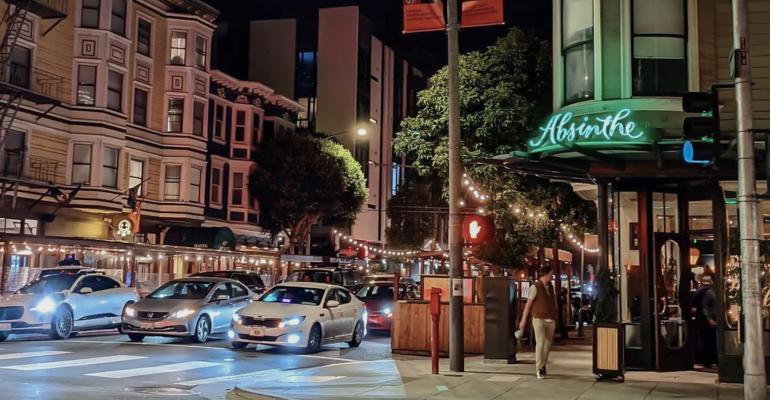First it was the pandemic. Then labor shortages, supply chain pressures, and margin-busting inflation. Now it’s an exodus of businesses and an outstanding question of whether workers will fully return to the office.
This is the past three years in a nutshell for San Francisco-based The Absinthe Group, which includes five concepts – Absinthe Brasserie & Bar, Arlequin Wine Merchant, Arbor, Bellota, and Comstock Station. Hurdles abound, yet Eric Vreede – who started as the general manager for TAG when it was created 25 years ago and was recently named president – is quite optimistic about the future of his company, as well its city.
“This industry has always had its unique challenges and San Francisco has its own unique challenges right now, but I’m bullish. Things are trending better,” Vreede said during a recent interview.
San Francisco’s “unique challenges” have been well documented. The city has the highest office vacancy rate of any large metropolitan market in the U.S., for instance, while tourism has fallen sharply since 2019. That said, Vreede’s optimism exists for a reason; visitor spending is increasing and workers are (slowly but surely) returning to the office as Bay Area companies push mandates and other incentives.
Anecdotally, Vreede said TAG’s five concepts are getting “busier and busier and sales trends are good.” Aside from the increasing foot traffic, his confidence comes from the adjustments TAG has made throughout the past three years; adjustments he says have made the company smarter and more efficient. Among those – tightening up labor hours and operations.
“For a long time, we had reduce staffing because we weren’t open. Then staffing became difficult. That’s not the case so much anymore, but we continue to run a much tighter operation. In a way, the pandemic offered up an opportunity to tighten up our staffing and systems and now we’re much more efficient.”
Absinthe used to serve breakfast, lunch and dinner seven days a week, for example. Now, it’s closed on Mondays and Tuesdays with shorter hours the remaining five days.
“We used to try and cover the whole waterfront. In the old days, it was frowned upon if we weren’t open; people would think we were in trouble. Now it’s more of the norm because it makes for a tight team, communications is easier, food is more consistent. It’s a great way to run a restaurant,” Vreede said.
Of course, there is a downside in generating less revenue, but Vreede said the trade off is worth it. And, if business comes back full speed, the company will not rule out adding a sixth day again. In the meantime, having those tighter operations has actually helped beef up staffing levels during an industrywide labor shortage. That said, staffing and retention levels have been strong at TAG since its beginnings 25 years ago because the company has long prioritized health care benefits and even offers a 401K plan.
“We’ve always been benefits heavy. It’s been a strong belief of ours since we opened, especially with health care, because it’s hard to go home at night and think people who are working for you aren’t covered,” Vreede said. “The industry is very youthful for the most part, and younger people tend not to think about their health or long-term financials, so us being able to offer something like this and explaining its importance is comforting.”
These benefits have been a priority in part because Vreede has such a unique perspective. His career has spanned the industry, from dishwasher to busser to GM to president.
“I have a pretty good understanding of what each of these positions are and challenges are. It’s easier to make decisions for staffing and to look out for people if you have a real understanding what they’re going through day to day,” he said.
That focus on the staff is going to continue to be a priority through TAG’s next 25 years. Vreede said the company’s philosophy is that employees who are well taken care of will in turn take care of their customers.
“The team we have running Absinthe now has been together for over 20 years and we hope they will play a huge part in the next 25,” Vreede said.
Growth is also potentially on the table, though nothing is imminent. TAG has grown its five concepts from the ground up, identifying real estate opportunities to complement its concepts. This includes a space that opened in the Airbnb building that is a perfect fit for its Spanish concept Bellota, or its three concepts in the arts-heavy Hayes Valley neighborhood. The company will continue to follow this strategy as San Francisco continues its recovery.
“We’re opportunists. People approach us with spaces and ideas all the time and we listen to everything,” Vreede said. “But our focus now is on getting the business as strong as we can in the short term and making sure we’re still very passionate about what we do.”
Contact Alicia Kelso at [email protected]





